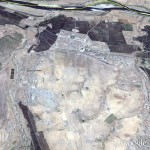Pictured above: Ontan Worker’s District, Onsong (Google Earth)
According ot the Daily NK:
In advance of next week’s lunar New Year’s Day holiday, National Security Agency agents are concentrating on getting together things for the holiday from households of those whose family members have crossed into China or South Korea.
Exploitation by the NSA or other powerful state apparatus is exceedingly common, of course, and the obtainment of necessities for holidays such as Kim Il Sung and Kim Jong Il’s birthdays, the Korean thanksgiving day (Chuseok) and lunar New Year’s Day are often covered via exploitation of the people. The difference this time, however, is that the specific targets are the families of defectors.
A source from North Hamkyung Province told The Daily NK today, “NSA agents in charge of northern border regions including Onsung have been engrossed in preparations for the holidays and generating private benefits, targeting smugglers and households with family members who have crossed into China or South Korea.”
The source explained, “Modes of exploitation by agents of the NSA and People’s Safety Ministry and cadres of the Party or prosecutors have been varied of late. They win houses which have problems over to their side and then get them to give certain things.”
The source said that as the lunar New Year’s Day comes closer, these moves have become more active and transparent. “NSA agents visit all of these houses and force them, or sometimes beg for things. They are no different from thieves, just without a knife.”
According to the source, the Conspiracy Research Office of the NSC in Onsung, North Hamkyung Province, which employs 25 agents, has allotted each agent items to get from their district.
There are two sets of items: one set is ten bottles of liquor, 5kg of pork, 20 packs of expensive cigarettes called “Yeomyung,” and the other set contains 20kg of gasoline, a certain amount of fruit and candy, and bottles of oil. Each agent has to select one set.
According to Onsung Jangmadang standards, a bottle of liquor can be bought for 4,000 won, 1kg of pork for 5,000 won, a pack of “Yeomyung” for 6,000 won, 1kg of gasoline 3,000 won, and a bottle of oil for 5,000 won.
In Ontan workers-district within Onsung, there are three agents. The goods assigned to them are also unaffordable, but only defector families have to provide them, the source said.
The source explained, “When an agent visits one’s home, they won’t leave until the host has set up a table of drinks for him. After drinking some, the agent coaxes them, ‘Have you got some news from the South?’ ‘Are you getting money well?’ or ‘When you get a call next time, you should grumble that the situation is hard, so that they will send more money.’”
Sometimes, agents call for bribes for their own family events, too. The source said, “While talking, agents hint furtively that there will be a family event and call for something for that, saying, ‘There will be nothing bad for you if you help out.’”
“Agents say openly that, ‘If more money is delivered, we can live well; it’s is a good thing, and a way to maintain socialism.’ They only need so much as to smell money and they come running,” the source complained.
Due to possible revenge from agents, people cannot complain about the situation and have to provide them with the things they demand, according to the source, who added, “However, the effect works only at that moment when they get the goods. When a problem occurs for these defector families, they are nowhere to be seen.”
Read the full story here:
Defector Families Are Moneybags for NSA Agents
Daily NK
Im Jeong Jin
1/27/2011

